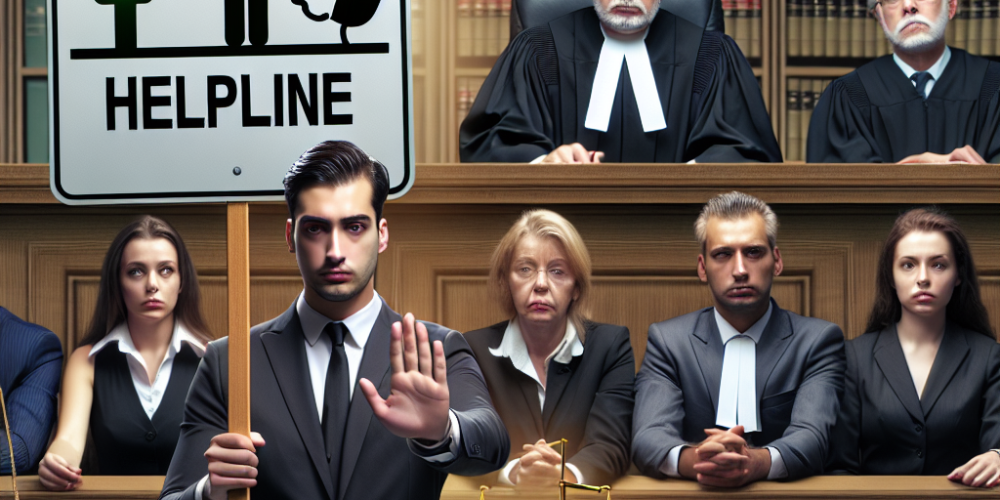The ongoing legal dispute over the control of the national gambling helpline, 1-800-GAMBLER, took another turn when a New Jersey court announced a delay in its decision-making process. The Council on Compulsive Gambling of New Jersey (CCGNJ) confirmed last Friday that the much-anticipated ruling, already postponed once, is now rescheduled for September 22. This ruling is crucial in determining which organization will ultimately manage the helpline that has been a lifeline for individuals grappling with gambling addiction.
The heart of the legal conflict lies between CCGNJ, which has managed the helpline for over 40 years, and the National Council on Problem Gambling (NCPG). In a surprising move three years ago, NCPG entered into a partnership with CCGNJ, complicating the governance of the hotline. The current situation escalated when a Mercer County judge was supposed to decide on September 3 whether to maintain a restraining order that limits NCPG’s influence in the helpline’s operations. This order, initially imposed in July, remains a pivotal point in the battle.
The helpline, 1-800-GAMBLER, has developed into a critical resource over the years, providing essential support and guidance to individuals struggling with gambling addiction. The disagreement intensified after the two organizations signed a supposed six-year contract last summer. NCPG maintains that a three-year renewal clause exists, while CCGNJ contests this claim. This discrepancy over contractual terms has only heightened the tension, coupled with differing opinions on managing the hotline effectively. NCPG has voiced concerns that CCGNJ has failed to fulfill its obligations, while CCGNJ counters with accusations of calls being disconnected or operators not always being available.
For CCGNJ, safeguarding the integrity of the service is paramount. Luis Del Orbe, the executive director of CCGNJ, emphasized last month that 1-800-GAMBLER has been reliably operating since 1983, highlighting the organization’s proficiency and long-standing commitment. Del Orbe assured that the number would continue to operate, irrespective of the court’s final decision. Yet, he stressed the necessity for improvements, ensuring that no state is left without access to the helpline and that callers receive more personalized information beyond typical online searches, preferably from a live operator.
Despite the friction, both parties agree on the fundamental importance of keeping the helpline accessible to those in need. NCPG regards itself as the “steward” of the number, committed to its ongoing availability. Conversely, CCGNJ insists on its right to oversee operations, a role it has held for decades.
The impending court decision on September 22 will be critical in determining who will manage one of the nation’s most vital resources for responsible gambling. This ruling will not only affect the future governance of the helpline but also set a precedent for how similar disputes might be resolved in the future.
In this contentious environment, stakeholders from both sides express confidence in their positions. A voice from within CCGNJ suggests that the organization’s deep-rooted understanding and historical expertise position them as the rightful overseer of the helpline. Meanwhile, supporters of NCPG argue that their broader national focus and resources could enhance the service’s reach and efficacy, potentially offering a more unified approach to tackling problem gambling on a larger scale.
The broader gambling industry is watching the case closely, recognizing its potential influence on how support services are managed and delivered across the country. Given the increasing prevalence of gambling-related issues, the outcome of this case could have far-reaching implications for similar services nationwide. The decision could also impact funding, operational procedures, and partnerships between state and national organizations dedicated to addressing gambling problems.
Ultimately, the case underscores the importance of maintaining robust, reliable support systems for individuals facing the challenges of gambling addiction. As both organizations await the court’s decision, the underlying motive remains the same: to ensure that 1-800-GAMBLER can continue to serve those in need effectively and compassionately.
The court’s ruling will not just be a matter of legal resolution but a significant step in shaping the future of problem gambling intervention. Both organizations stand ready to adapt, hoping to align their resources and expertise with the court’s decision to best serve the public interest. As September 22 approaches, the anticipation grows, with industry insiders and affected individuals alike eager for clarity and resolution in this critical area of public health support.

David Harrison stands tall in gambling journalism, marrying his firsthand casino experiences with a deep understanding of betting psychology. His articles transform complex gambling jargon into engaging tales of strategy and chance, making the world of betting accessible and enjoyable. David’s knack for narrative extends beyond print, making him a sought-after speaker on gambling trends and future bets. In the realm of gambling, David is both a scholar and a storyteller, captivating readers and listeners alike.
















